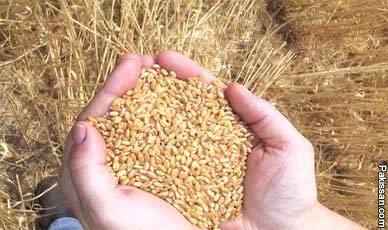|
Main Page
|
![]() |
Stocking grains for family use
By Altamash M. Kureshi
 IT
is shocking that ten Afghans are reported to have died
and more than 100 fallen ill with liver disease after
eating wheat contaminated with a poisonous plant that
grows with it. It is the second such incident after
1974. IT
is shocking that ten Afghans are reported to have died
and more than 100 fallen ill with liver disease after
eating wheat contaminated with a poisonous plant that
grows with it. It is the second such incident after
1974.
Not very long ago when market forces were yet to be
unleashed in the name of globalisation, the country’s
rural areas were still holding ground as the bulwark for
producing food grains, pulses, vegetables, milk, ghee
and above all cheap labour for the urban dwellers. They
were not only feeding the entire country with quality
food stuff but were the main source of raw material for
the cotton ginning and pressing factories to export the
value-added cotton related products.
Up to 1956-57 the country had achieved autarky in food.
Food grains were produced in abundance and sold in the
market by rural community after saving some stock for
the use of their families during lean periods. Since
wheat was the staple food, it was ensured that not only
it was stored properly but also protected from fungus
and other insects.
The method employed was indigenous, cheap and very
simple. What they did was that first the grain was kept
in earthen wares which are good at absorbing moisture;
hence the best safety from fungus infection. Thereafter,
the leaves of Neem, an evergreen tree known as nature’s
drugstore, were used to protect the grain from different
insects.
This evergreen tree which is anthelmintic, anti-fungal,
antibacterial, antiviral, anti-infertility, and sedative
is grown in Sindh in abundance. It was not only used for
different ailments but its thin branches were also used
for cleansing teeth.
In the summer because of its thick foliage, the tree
provides cool air. Therefore, people prefer resting
under its shade. In India, it is considered a major
component in Ayurvedic medicine and is particularly
prescribed for skin disease. It is also said that Neem
tree protects from common flue and is planted almost in
every house in interior Sindh.
When the stored wheat was brought out for use, the
household ladies first of all rinsed it with clean water
to purify it of dust and any insects and then keep it
under the sun for a whole day to dry. After these
processes, it was sent to atta chaki for grinding.
These traditions have vanished and are now stories of
the past. The rural economy which up to sixties was
vibrant and self-sufficient in food items gradually got
impoverished because of government’s subsequent lopsided
policies, tilted towards urban development. So much so
that even the peasants whose main staple is wheat are
not able to preserve it for their family use because of
other pressing day-to-day demands. Thus they are now
constrained to purchase flour from the open market. This
flour is derived from wheat imported from wheat-surplus
developed countries.
It is a known fact these countries do not sell their
fresh produce. The fresh surplus grain they always keep
for emergencies. What they always offer for sale is the
old stocks in the cycle of three years. In order to keep
these stocks safe from various insects, different
chemical preservatives are used. Therefore, the stuff is
not as healthy as fresh one.
When these chemically-treated stocks are not cleansed
before sending to flour mills, the grain becomes highly
injurious for human health. Unfortunately, the small
atta chakies spread over the vastness of country are not
conscious of these hazards of utilising this untreated
wheat. As a result, people living in our rural areas are
suffering from numerous ailments. Another significant
factor which has contributed towards the deteriorating
health of our people is the use of unwholesome flour
from which various by-products such maida, suji and
nishasta have already been separated leaving it less
nutrient.
Agriculture being the backbone of economy has suffered
from continuous neglect. However, its innate strength
and buoyancy can be brought back to its primal position
if appropriate polices are made for the development of
agriculture sector as a whole. It is in the well-being
and comfort of the growers where the self-sufficiency
and happiness of the country lies.
Courtesy: The DAWN |
|
Pakissan.com;
|
|
|